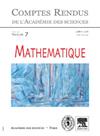不可约特征的协度的p部分
IF 0.7
4区 数学
Q2 MATHEMATICS
引用次数: 5
摘要
对于有限群G的一个特征χ, χ的共度为χc (1) = [G:kerχ] χ(1)。设p为质数,e为正整数。本文首先证明了如果G是p可解群,使得对于G的每一个不可约字符χ, p +1 χc(1),则G的p长度不大于e。然后研究了满足p2不除其不可约字符的协度的条件的有限群。数学学科分类(2010)。20c15, 20d10, 20d05。稿件于2020年4月22日收稿,于2020年11月24日修订并接受。本文章由计算机程序翻译,如有差异,请以英文原文为准。
p-parts of co-degrees of irreducible characters
For a character χ of a finite group G , the co-degree of χ is χc (1) = [G :kerχ] χ(1) . Let p be a prime and let e be a positive integer. In this paper, we first show that if G is a p-solvable group such that pe+1 χc (1), for every irreducible character χ of G , then the p-length of G is not greater than e. Next, we study the finite groups satisfying the condition that p2 does not divide the co-degrees of their irreducible characters. Mathematical subject classification (2010). 20C15, 20D10, 20D05. Manuscript received 22nd April 2020, revised and accepted 24th November 2020.
求助全文
通过发布文献求助,成功后即可免费获取论文全文。
去求助
来源期刊
CiteScore
1.30
自引率
0.00%
发文量
115
审稿时长
16.6 weeks
期刊介绍:
The Comptes Rendus - Mathématique cover all fields of the discipline: Logic, Combinatorics, Number Theory, Group Theory, Mathematical Analysis, (Partial) Differential Equations, Geometry, Topology, Dynamical systems, Mathematical Physics, Mathematical Problems in Mechanics, Signal Theory, Mathematical Economics, …
Articles are original notes that briefly describe an important discovery or result. The articles are written in French or English.
The journal also publishes review papers, thematic issues and texts reflecting the activity of Académie des sciences in the field of Mathematics.

 求助内容:
求助内容: 应助结果提醒方式:
应助结果提醒方式:


